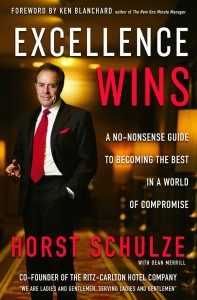5 Favorite Quotes from “Excellence Wins” by Horst Schulze

For those of us in the business of serving customers, when Horst Schulze, co-founder and former president of the Ritz-Carlton Hotel Company speaks, we listen. Why? Well, the Ritz-Carlton has long been a gold standard for service, and in the book Excellence Wins, Schulze lays out his philosophy and formula for success.
First of all, I thoroughly enjoyed this book! In this article, I’ll briefly share five quotes and insights that I found particularly helpful. Let’s dive right in.
A better form of benchmarking is to measure how you’re doing compared to how you were doing a year ago or three years ago. Are you making headway? Do you have a higher percentage of people who are pleased with your service?
Schulze mentions this in a section about surveying customers and the importance of listening to the voice of our customers. But I’ve often wondered about the value of benchmarking metrics like customer satisfaction, Net Promoter Score, and the like. Some of this is born out of wondering whether our scores are “good” or not and some of this is born out of clients at an outsourcer asking how their scores compare with other clients.
I agree with Schulze that, while benchmarks might be nice to know how our scores initially compare to the competition, the most important activity is to benchmark against our own past performance, making measurable improvements over time.
Sometimes a customer service problem — or any defect, for that matter — is rooted as much as five steps away from where it shows itself. One solitary person at a counter somewhere can’t solve it alone. It needs the best thinking of everyone connected to the process because they are fully committed to giving the customer every reason to keep coming back — again and again.
Have you ever worked in an organization where they solved customer experience problems by identifying the single person at fault and firing them? I’ve definitely seen this in action. What if we instead recognize that certain problems are inherently complex and require a team, not just one individual to improve and solve. Certainly, if an organization has a customer experience leader, they can promote this sort of collaboration rather than being the person to actually solve the problem.
After analyzing thousands upon thousands of comment cards and surveys over the years, I can tell you that 2 percent of customers simply cannot be pleased. They’re clearly irrational. They want things you can’t afford. Or they want things that will irritate the other 98 percent. I call this small population “the jerk factor.”
Ah the irrational customer where no amount of reasoning will ever get through to them. If I’m being honest, early in my career I thought this percentage was more in the range of 20 to 50% — but that’s before I learned about emotional intelligence and that I had the power to choose how I would respond to upset customers.
We must first learn to respond with emotional intelligence to customers, understanding that in most cases they aren’t angry at us but at an inconvenience caused to them. Then we begin to indeed realize that this “jerk factor” that Schulze speaks of only applies to a very small subset of customers.
Loyalty is cemented not by extra points, gimmicks, or goodies. It is rather confirmed by fulfilling the customer’s expectations every time they make contact with us.
In this section of the book, Schulze talks about the act of locking customers into long-term contracts or overly complex loyalty programs. And in these cases, loyalty seems to be about finding ways to hold customers captive as opposed to creating something they truly want to be a part of.
I can remember one conversation years ago with a customer after we had an outage in our system. I offered the customer credit on their account and he responded by saying “Sure, I’ll take the credit. But really what I want is for your service to work reliably. My business depends on it.” Consistency and reliability are first and foremost what’s required to gain loyal customers.
I instituted a short stand-up meeting at the beginning of every shift to focus on one of our twenty-four Service Standards.
I’m not going to talk about all 24 service standards, but this list in Chapter 8 of the book is impressive. One of my favorites is number 12 which says “Escort guests until they are comfortable with the directions or make visual contact with their destination. Do not point.” I’m reminded of the hardware store employee that walks me to the product I seek rather than pointing to the aisle I should go to. This extra effort makes a huge difference.
The most impressive part about these 24 service standards is that Schulze’s teams consistently review one of these in each of their meetings. They also carry these with them while they work to ensure that everyone understands and lives these out every day.
Finally, have you read Excellence Wins yet? If not, read it and leave a comment below with your favorite quotes or insights from the book.